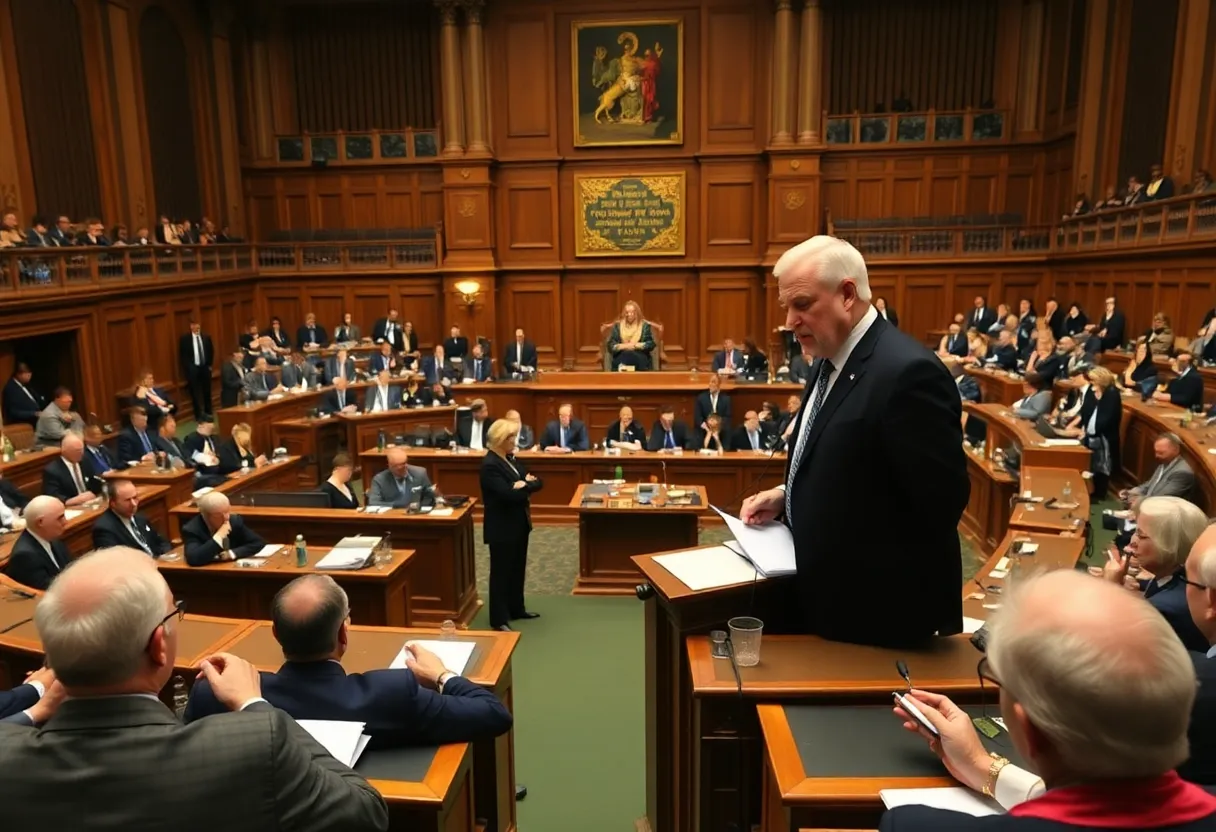News Summary
On March 26, 2025, the Flemish Parliament engaged in a heated discussion regarding the accountability of asbestos producers, particularly Eternit. As political parties unite to demand that corporations bear the costs of asbestos removal, the debate raises urgent questions about public health, corporate responsibility, and the financial implications for taxpayers. With projected costs reaching €100 million annually for the next twenty years, this dialogue emphasizes the need for strict regulations to prioritize community safety over corporate gains.
Flemish Parliament Sparks Asbestos Accountability Debate
On March 26, 2025, a crucial hearing unfolded in the Flemish Parliament, centering on the responsibilities of asbestos producers. As discussions raged on, the industry giant Eternit stood firm, dismissing any potential legal obligations for compensation as “disproportionate” and “possibly discriminatory.” This contentious exchange raises alarming questions regarding the accountability of companies that handle hazardous materials, and why the public should bear the burden of cleaning up toxic hazards.
The Burden of Asbestos: Who Pays?
As the debate echoed throughout the parliament chambers, it became evident that the N-VA, Vooruit, CD&V, Open VLD, and Groen parties are forging a united front demanding that companies like Eternit shoulder the financial implications of asbestos removal. The stakes are high, with the estimated cost looming at an astounding €100 million annually over the next twenty years. These costs raise a significant dilemma: should taxpayers really pay for the negligence of private corporations?
By shifting blame onto consumers, companies often sidestep their responsibility, arguing that individuals should have been aware of the dangers posed by their products. This stance is not only misleading but also highlights a critical concern about public awareness. Many reside in homes constructed when the dangers of asbestos were not fully understood. It is evident that public health interests must take precedence as governments grapple with how to manage hazardous materials.
Government’s Role in Public Safety
The government bears a substantial responsibility in ensuring public safety regarding hazardous materials like asbestos. There is a pressing need for effective regulations that hold producers accountable, protect citizens, and ultimately prevent health risks associated with asbestos exposure. The recent resolution from Flemish political parties aimed at ramping up accountability is a promising step, and it reveals a growing sentiment for enhanced safety standards within both local and global contexts.
Raising awareness about the dangers of asbestos is not merely an option; it is a necessity. Many people remain in the dark about the presence of asbestos in older buildings and products, leading to negligent behaviors that could endanger lives. Increased educational outreach can empower communities, spurring individuals to advocate for safer living and working environments.
Towards a Cleaner Future
As discussions continue surrounding the responsibilities of companies like Eternit, it’s clear that action must follow rhetoric. Stricter regulations could lead to a safer future, allowing communities to eradicate the lingering threat of asbestos exposure. The Flemish government has assigned OVAM the task of analyzing current management strategies for asbestos, signifying a desire for the adoption of more robust measures that prioritize public well-being over corporate gains.
A Call to Action
The conversation concerning asbestos is not simply concerning the past but is indeed about our collective future. Governments globally must pivot toward strategies that enhance safety standards for dealing with hazardous materials. The paradigm needs to shift, ensuring that companies are held responsible for the ramifications of their actions. By demanding accountability, society can protect citizens from potential health risks and pave the way for a cleaner, safer community.
The time for action is now, and as efforts intensify in Belgium, the hope remains that similar initiatives can resonate and find traction across the globe. This can ultimately shape a healthier world, where individuals no longer need to fear the repercussions of corporate negligence regarding toxic materials.
Deeper Dive: News & Info About This Topic
HERE Resources
Asbestos Concerns Mount as Demolition Continues at Li’l Abner Mobile Home Park
Revolutionary Updates in Mesothelioma Treatment: ASCO Guidelines Unveiled
Concerns Over Fire and Asbestos Risks in the Palace of Westminster
Johnson & Johnson Faces Tough Questions in Mesothelioma Case
Recent Court Rulings Spark Controversy in Asbestos Litigation
Health Risks Surface After Eaton Fire: Asbestos Found in Burn Areas
The Hidden Danger in Beauty Products: Talc and Asbestos Contamination
Baie Verte’s Abandoned Asbestos Mine Undergoes Transformation
Justice Secured for Mesothelioma Victim Thomas R. Sorrentino
Asbestos: A Silent Killer for Veterans and City Residents in San Diego
Additional Resources
- Brussels Times: Shameless Bribes – Flanders Restarts Hunt for Asbestos Producer Eternit
- Wikipedia: Asbestos
- Brussels Times: Removing All Eternit Asbestos in Flanders Requires €100 Million Annually Over 20 Years
- Google Search: Asbestos removal
- Brussels Times: Forgotten Killer – Belgian Asbestos Victims Seek Real Sense of Justice
- Google Scholar: Asbestos health risks
- Brussels Times: Flanders to Pay Full Price for Asbestos Removal in Region’s Schools
- Encyclopedia Britannica: Asbestos



















